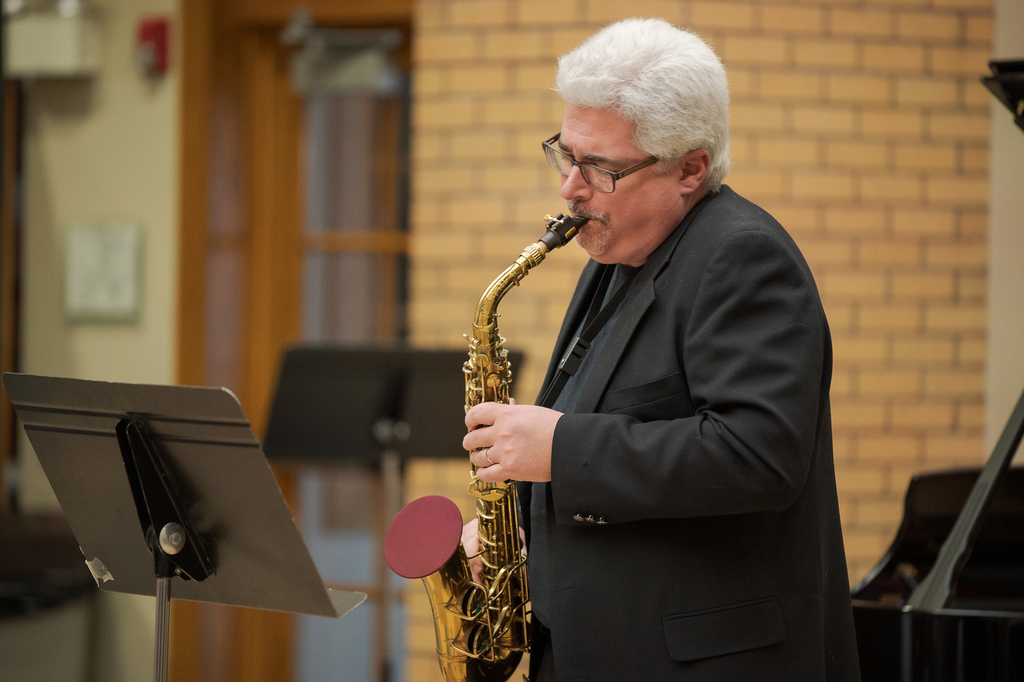Michael Stephens, CSC's resident composer

CHADRON – Composing music is a long-term passion for Dr. Michael Stephens, Chadron State College Professor.
“I always have some music I am working on when time allows,” said Stephens who has been composing music for 33 years.
His recent composition, Breathless, was performed for the first time at a May concert on campus.
“I composed Breathless shortly after the murder of George Floyd, because black lives matter. For me, the three sections, in A-B-A form, have symbolic meaning. The first is an expression of grief. The second represents anger at the injustice. The dynamics of the third section reflect the reaction in our country,” Stephens said. “It is a piece I would like to perform again, and maybe often.”
He is interested in recording the composition and has considered a version that includes sound samples from video coverage of events.
Stephens said his compositions fall into three categories: jazz or jazz-influenced, contemporary-classical, and pedagogical.
“In recent years, my goal has been to merge my musical styles. Breathless brings together my jazz style with my contemporary-classical language,” Stephens said.
Stephens writes most of his work by himself, but has collaborated with others occasionally and for decades with his longtime friend Warren Henry, who lives in Ohio.
“In the early ‘90s, I would often sit in with Warren and a band he was in, Fat City Blues. Then he and I started a jazz fusion group, Osmosis. In that band, we not only performed and recorded together, but also collaborated on compositions,” he said.
Stephens and Henry missed working together after Stephens moved to Chadron, so they sent musical ideas back and forth electronically before the pandemic and continued throughout it.
Recently, Stephens finished composing It’s a Rainy Day for CSC’s jazz band. The impetus was simply dropping his daughters off at school in December 2020.
“It was one of those all-day, light rains we don’t see too often in this part of the country. I remember looking over at Alyssa, and just spontaneously sang It’s a Rainy Day. Often, I do odd things like that to get a strange look from my daughters,” Stephens said. “I liked the melody, so I went home and started working on it.”
Another recent work is All In Good Time, for marimba and trombone. The piece was selected by a panel of University of Nebraska-Kearney musicians to be part of the UNK New Music Festival. Stephens wrote it for CSC Assistant Professor Dr. Rick Puzzo and his daughter, Abby Lyon, who performed it in March 2020.
“We had intended to have a performance at CSC, but campus closed. Since Abby was in Chadron, we recorded the piece,” Stephens said. “With All In Good Time, the title is the last thing that came to me. The piece is quite rhythmically challenging, so the performers must have good rhythm, or good time for the performance to be successful.”
Other works by Stephens have also been chosen for the UNK New Music Festival: Echoes in Time, performed by Puzzo on marimba and Stephens on soprano saxophone in 2018, and Chadron Sketches, performed by the CSC Saxophone Quartet, Drew Kasch (soprano), Sean DeHaven (alto), Jedd Raymond (tenor), and Forrest Holso (baritone) in 2016.
Stephens’ outreach efforts also include working with regional schools.
He composed Westward Movement for the Scottsbluff eighth grade band, rehearsed it with them, and directed the premiere of the piece in late May 2019.
In a personal composition, Stephens dedicated Cerulean Shadows to the memory of his former colleague Charles Carey, who died in 2019. It was recorded during the pandemic so most of the musicians were never in the same room.
“I sent electronic versions (of the sheet music) to everyone, they sent me their recorded parts, and I put them together. Both Joel (Schroeder) and Rick (Puzzo) contributed tracks, as well as Warren,” Stephens said. “Because we know each other very well as musicians, the recording process worked. It’s easy for us to be forthright with each other. The process can move so much more quickly when the musicians are in the same room. However, I appreciated being able to interact musically at a time when it couldn’t happen any other way.”
—Tena L. Cook, Marketing Coordinator
Category: Campus News
